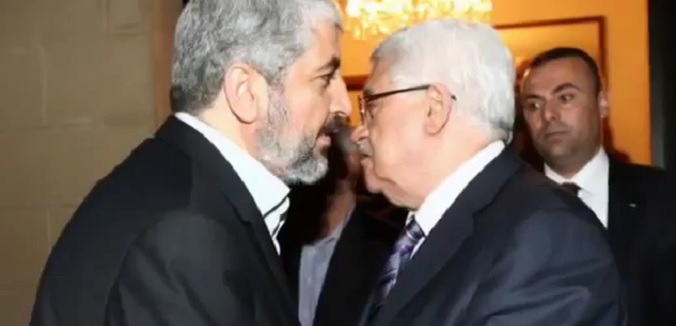The main impediment to peace between Israel and the Palestinians is the lack of unity between Fatah and Hamas, which prevents Israeli diplomats from facing a legitimate interlocutor who represents all Palestinians, Jonathan Schanzer, the vice president for research at the Foundation for Defense of Democracies, wrote in an analysis for Politico on Tuesday.
While the past two U.S. administrations have sought to broker peace between Israel and the Palestinians, they suffered from a “bipartisan blind spot,” namely attempting “to achieve a two-state solution without giving serious thought to solving the current three-state scenario,” Schanzer noted.
Palestinians in the West Bank are ruled by Fatah, the main party in the Palestinian Authority, which “is open to making a deal with Israel in theory, but refuses in practice thus far.” Meanwhile, the Gaza Strip is controlled by the terrorist group Hamas, which seeks “Israel’s destruction based on both religious and nationalist grounds.”
Schanzer observed that the Bush administration’s plan to encourage elections between the two factions in 2006 ended up empowering Hamas, which subsequently ejected Fatah from Gaza in 2007, exacerbating the rift between the parties. Today, “both rule with brutality, for fear that the other may attempt to consolidate power across the Palestinian divide,” Schanzer observed.
He credited other nations for trying to address the Palestinian split, including most recently Russia, though even the recent announcement that the two parties had agreed to a “national council” in Moscow came “amidst reports of that Hamas and Fatah were accusing each other of carrying out ‘politically motivated’ arrests in their respective territories.” Ultimately, Russia’s effort “was yet another false alarm.”
The Obama administration, Schanzer observed, avoided addressing “the geopolitical split that renders any Palestinian leader incapable of signing a peace agreement with Israel,” and instead focused on Israeli communities in the West Bank. However, achieving peace between Israel and the Palestinians requires first “[solving] the Palestinian internecine conflict,” so the focus on Israel was “putting the cart before the horse.”
Effort to strengthen Fatah at the expense of Hamas, such as the Obama administration’s last minute grant of $221 million to the PA — despite a congressional hold on the funds — have also been tepid and failed to address the main obstacle to peace.
Schanzer acknowledged that getting Hamas on board will be a challenge, requiring the group to “disarm, relinquish its control of the Gaza Strip and allow for a single Palestinian Authority government to rule.”
A “bold step” President Donald Trump could take to advance this effort would be to appoint a Special Envoy to Solve the Palestinian Conflict. “In doing so, his message would be clear,” Schanzer wrote. “The United States is committed to diplomacy between Palestinians and Israelis, which hinges on a solution to the longstanding Palestinian internal dispute.”
[Photo: ellen cooper / YouTube]




